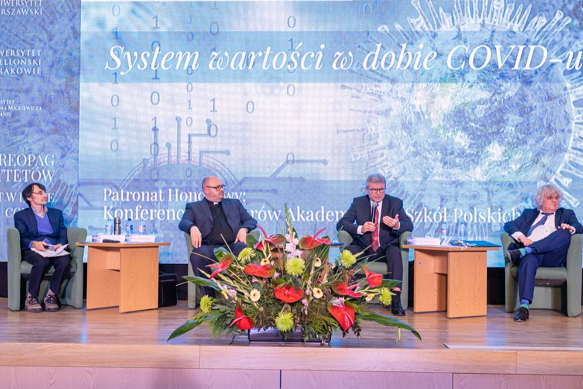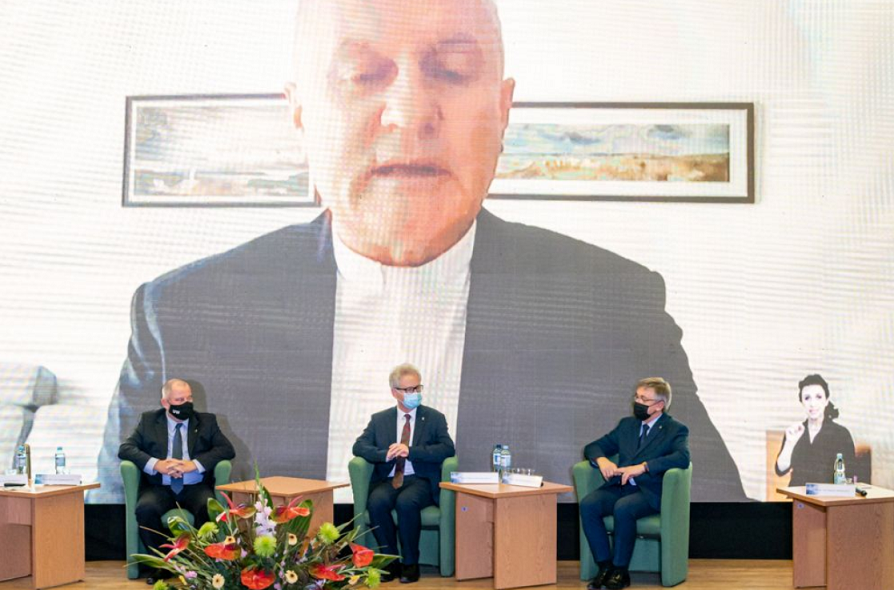A Catholic Polish university has initiated unprecedented debates between universities (in ENG+ESP+PL)


photo. kul.pl
The University Areopagus is an unprecedented initiative of the Catholic University of Lublin, whose partners have become other leading Polish universities: the University of Warsaw, the Jagiellonian University and the Adam Mickiewicz University in Poznań. The main idea of the Areopagus is to conduct a public debate on the challenges of the present day, in an academic environemt, with the participation of any interested parties. The first of these debates took place on 18th October at the John Paul II Catholic University of Lublin
*
El Areópago de las Universidades es una iniciativa sin precedentes lanzada por la Universidad Católica de Lublin, cuyos socios han pasado a ser otras importantes universidades polacas: la Universidad de Varsovia, la Universidad Jagellónica y la Universidad Adam Mickiewicz de Poznań. La idea principal de Areópago es conducir debates públicos sobre los retos contemporáneos en el espacio universitario con la participación de todas las partes interesadas en el tema. El primer debate tuvo lugar el 18 de octubre de este año en la Universidad Católica de Lublin (UCL).
*
Areopag Uniwersytetów jest bezprecedensową inicjatywą Katolickiego Uniwersytetu Lubelskiego, którego partnerami stały się inne czołowe polskie uniwersytety: Uniwersytet Warszawski, Uniwersytet Jagielloński i Uniwersytet im. Adama Mickiewicza w Poznaniu. Główną ideą Areopagu jest prowadzenie debaty publicznej o wyzwaniach współczesności w przestrzeni uniwersyteckiej z udziałem wszystkich zainteresowanych tematem stron. Pierwsza z debat odbyła się 18 października br. na KUL.
Four universities, their rectors, experts, scientists – authority figures in their fields of study, students, and invited guests will be the participants in a series of four meetings, during which various topics will be discussed, from medicine to humanities and social sciences, economics, economic activity and management. “Universities should be a place for discussion and exchange of arguments on topics related to important, current issues. The developed theories and conclusions may constitute the basis for media messages and direct the social discourse based on knowledge, science and experience “- emphasized the Rector of the Catholic University of Lublin, Rev. Fr. prof. Mirosław Kalinowski.
The first debate “The System of Values and the COVID Era” was held on Monday, 18th October at the Knowledge Transfer Centre of the Catholic University of Lublin. Opening the debate, the Rector of the Catholic University of Lublin, Fr. Prof. Mirosław Kalinowski emphasized the importance of dialogue. “Maybe we will not find answers to the questions that will arise, but we will find more elements that unite us than divide us,” he said.
“The pandemic revealed to us the value of love, which takes many different forms: compassion, understanding, help, brotherhood, patriotism, longing for closeness,” said one of the experts, Rev Fr. Dr. Hab. Cezary Smuniewski from the University of Warsaw. In the professor’s opinion, thanks to the pandemic, the values people hold have been revealed with new clarity, in the same was as with the uniqueness of each person. This is a chance to re-focus on personalism, which has the power to protect us from the Scylla of individualism and the Charybdis of collectivism. It is also an opportunity to rethink the importance of our ability to enter into relationships – he emphasized.
“We are fed with mediocrity, and as a result, we slowly lose the taste of good” – said another expert, Prof. Leszek Sosnowski from the Jagiellonian University.
In turn, Prof. Zbyszko Melosik from the Adam Mickiewicz University in Poznań, noted that from the perspective of history, the pandemic is not an isolated incident. – The epidemic showed that the human condition is very fragile and has hit its arrogant conviction that man has already tamed nature – he emphasized. In his opinion, the pandemic will not permanently change the world of values held by modern man, it is only possible in the case of people who have suffered an individual tragedy, e.g. the death of a loved one. – Our system of values has remained largely unchanged in the social sense, and people have returned to the consumptive lifestyle – he said. He added that humanity has never been and will never be oriented only on lofty values, but it cannot be said that today we are dealing with the bankruptcy of humanity and its ideals, and the permanence of values which is proved by the passion that is constantly present in the life of the academic community.
The meeting was open to the public, therefore, apart from the academic community, all interested parties were invited. The Conference of Rectors of Academic Schools in Poland took the honorary patronage over the Areopagus of Universities.
The topics of subsequent debates will be: “Medicine, public health, science, health”, “Humanities and social sciences, social relations”, “Economics, economy, finances, management”.
The official internet site of the Catholic University of Lublin, kul.pl >>>

photo. kul.pl
*
Cuatro universidades, sus rectores, expertos, científicos, autoridades en sus campos, estudiantes, así como invitados, participan en una serie de cuatro reuniones en las que se debaten diversos temas, desde la medicina hasta las humanidades y las ciencias sociales, pasando por la economía y la gestión. 2Las universidades deben ser un lugar de debate e intercambio de tesis sobre temas que atañen a problemas importantes y actuales. Las conclusiones y los hallazgos pueden ser la base de una cobertura mediática y orientar el discurso social basado en el conocimiento, la ciencia y la experiencia”, subrayó el rector de la Universidad Católica de Lublin, el profesor Mirosław Kalinowski.
El primer debate, titulado “El sistema de valores en la era del COVID”, tuvo lugar el lunes 18 de octubre en el Centro de Transferencia de Conocimientos de la UCL. En la apertura, el rector de la Universidad Católica de Lublin, el reverendo Prof. Mirosław Kalinowski, destacó la importancia del diálogo. “Puede que no encontremos respuestas a las preguntas que se planteen, pero sí más elementos que nos unan que los que nos dividan”, dijo.
“La pandemia nos ha revelado el valor del amor, que adopta muchas formas diferentes: el sufrimiento compartido, la comprensión, la ayuda, la hermandad, el patriotismo, el anhelo de cercanía”, dijo uno de los expertos, el reverendo Dr. hab. Cezary Smuniewski, de la Universidad de Varsovia. Según el profesor, gracias a la pandemia, los valores se han revelado con una nueva claridad, al igual que la singularidad de cada persona. Es una oportunidad para reconsiderar el personalismo, que tiene el poder de protegernos de la Escila del individualismo y de la Caribdis del colectivismo. También es una oportunidad para replantearnos la importancia de nuestra capacidad de entablar relaciones”, subrayó.
“Nos alimentan con la mediocridad, y como resultado perdemos lentamente el gusto por lo bueno”, dijo otro experto, el profesor Leszek Sosnowski, de la Universidad Jagellónica.
Por su parte, el profesor Zbyszko Melosik, de la Universidad Adam Mickiewicz de Poznań, señaló que, desde una perspectiva histórica, la pandemia no es un hecho aislado. “La epidemia ha demostrado que la condición humana es muy frágil y ha golpeado su arrogante creencia de que ya ha domesticado la naturaleza”, subrayó. En su opinión, la pandemia no cambiará permanentemente el mundo de los valores del hombre moderno; eso sólo es posible en el caso de personas que hayan experimentado una tragedia individual, como la muerte de seres queridos. “Nuestro sistema de valores no ha cambiado mucho en el sentido social, y la gente ha vuelto al estilo de vida consumista”, dijo. Añadió que la humanidad nunca ha estado ni estará orientada únicamente hacia valores elevados, pero no se puede decir que hoy estemos ante la quiebra de la humanidad y de sus ideales, y la perdurabilidad de los valores se demuestra por la pasión constantemente presente en la vida de la comunidad académica.
La reunión estaba abierta a todos, por lo que se invitó a todas las partes interesadas de fuera de la comunidad académica. El Areópago de las Universidades se celebró bajo el patrocinio honorífico de la Conferencia de Rectores de Escuelas Académicas de Polonia.
Los temas de los siguientes debates serán: “Medicina, salud pública, ciencias, sobre la salud”, “Humanidades y ciencias sociales, relaciones sociales” y “Economía, administración, finanzas, gestión”.
*
Cztery uniwersytety, ich rektorzy, eksperci, naukowcy – autorytety w swych dziedzinach, studenci, a także zaproszeni goście są uczestnikami cyklu czterech spotkań, podczas których poruszane są różnorodne tematy od medycyny po nauki humanistyczno-społeczne, ekonomię, gospodarkę i zarządzanie. „To uniwersytety powinny być miejscem dyskusji i wymiany argumentów na tematy, które dotyczą ważnych, aktualnych problemów. Wypracowane wnioski, konkluzje mogą stanowić bazę do przekazów medialnych i ukierunkować dyskurs społeczny w oparciu o wiedzę, naukę oraz doświadczenie” – podkreślił Rektor KUL ks. prof. Mirosław Kalinowski.
Pierwsza debata pt. „System wartości w dobie COVID-u” odbyła się w poniedziałek 18 października w Centrum Transferu Wiedzy KUL. Otwierając ją Rektor KUL ks. prof. Mirosław Kalinowski podkreślił wagę dialogu. „Może nie znajdziemy odpowiedzi na pytania, które będą się rodziły, ale znajdziemy więcej elementów, które nas łączą niż dzielą” – mówił.
„Pandemia odsłoniła nam wartość, którą jest miłość, przybierająca wiele różnych form: współcierpienie, zrozumienie, pomoc, braterstwo, patriotyzm, tęsknota za bliskością” – mówił jeden z ekspertów, ks. dr hab. Cezary Smuniewski z Uniwersytetu Warszawskiego. Zdaniem księdza profesora dzięki pandemii wartości odsłoniły się z nową wyrazistością, tak jak stało się to choćby z niepowtarzalnością każdej z osób. To szansa, by na nowo pochylić się nad personalizmem, który ma moc chronić nas przed Scyllą indywidualizmu i Charybdą kolektywizmu. To także szansa, by na nowo przemyśleć jak ważna jest nasza zdolność do wchodzenia w relacje – podkreślał.
„Jesteśmy karmieni bylejakością, w efekcie zatracamy powoli smak dobra” – stwierdził inny ekspert, prof. Leszek Sosnowski z Uniwersytetu Jagiellońskiego.
Z kolei prof. Zbyszko Melosik z Uniwersytetu im. Adama Mickiewicza w Poznaniu zauważył, że z perspektywy historii pandemia nie jest faktem odosobnionym. – Epidemia pokazała, że kondycja człowieka jest bardzo krucha i uderzyła w jego aroganckie przekonanie, że już ujarzmił naturę – podkreślił. Jego zdaniem pandemia nie zmieni na stałe świata wartości współczesnego człowieka, jest to możliwe jedynie w przypadku osób, które spotkała indywidualna tragedia, np. śmierć bliskich. – Nasz system wartości pozostał w sensie społecznym bez większym zmian, a ludzie powrócili do konsumpcyjnego stylu życia – stwierdził. Dodał, że ludzkość nigdy nie była i nie będzie zorientowana jedynie na wzniosłe wartości, ale nie można także powiedzieć, że dziś mamy do czynienia z bankructwem ludzkości i jej ideałów, a trwałości wartości dowodzi choćby pasja stale obecna w życiu społeczności akademickiej.
Spotkanie miało charakter otwarty, dlatego poza środowiskiem akademickim zaproszeni zostali wszyscy zainteresowani. Patronat Honorowy nad Areopagiem Uniwersytetów objęła Konferencja Rektorów Akademickich Szkół Polskich.
Tematami kolejnych debat będą: „Medycyna, zdrowie publiczne, nauki, o zdrowiu”, „Nauki humanistyczno-społeczne, relacje społeczne”, „Ekonomia, gospodarka, finanse, zarządzanie”.



Dodaj komentarz